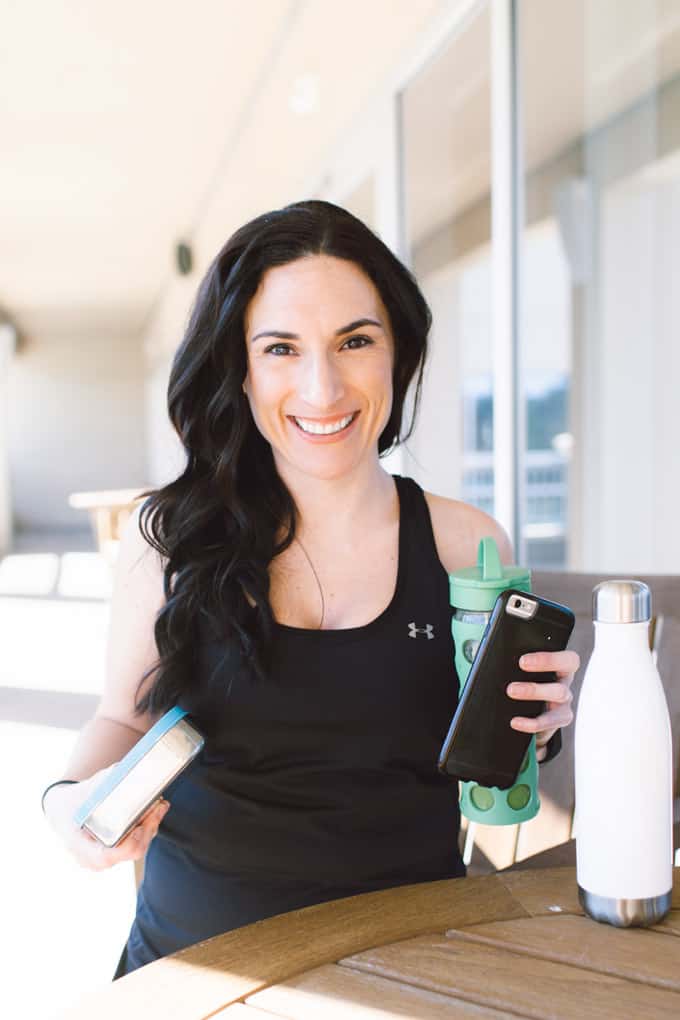This post may contain affiliate links. Read our disclosure policy here.
No matter where you look, protein powder is everywhere. With so many choices available on ingredients and flavors, how do you know which one is best for you?
On this site, I focus on healthier eating and living a healthier lifestyle as a mom. So, when it comes to supplements, I do my research and have tried a lot of different brands before recommending them to my audience.
While I don’t use protein powder every day, I do find it to be a beneficial supplement for my health on days where I need a quick recovery drink after a workout, a portable meal, or simply making sure not too many hours go by without consuming food.
Therefore, everything you’ll read in this post comes from someone who has 3 kids, is 40-years-old, and lives a fairly active lifestyle.

Is Protein Powder Good for You?
Protein powder is a terrific supplement to add to your diet. Many protein powders have added nutritional benefits such a fiber, vitamins, and minerals and secondary health benefits (like collagen protein).
Protein powder is an effective supplement to help with muscle recovery, losing fat, and leaning / toning-up. Plus, it’s a convenient and healthy addition to your snack routine.
I personally don’t like the “shaker” method of water + protein powder but for the recommendations below, I tried and tested them with water only to make my selections.
With so many protein powders available, it can be tough to select one based on your needs.
This post will focus on the types of protein powder, the best tasting and textures, and my go-to shaker way of enjoying protein powder.
Types of Protein Powder
There are several types of protein powder that are often recommended for women: whey protein, pea protein, collagen protein, egg protein, hemp protein, rice protein, and plant-based proteins.
For the purpose of keeping this post precise and to the point -also less confusing and helpful, I am going to cover whey protein, collagen protein, and plant-based protein (this includes pea protein).
Whey Protein Powder Benefits
Whey protein powder has many benefits since it’s a complete protein and it’s the most recommended when using for recovery (post-workout) from strength training.
A complete protein means that it contains all nine essential amino acids necessary in the human diet. All nine amino acids are essential for both muscle and cellular building + recovery.
In addition, whey protein is very digestible and absorbed quickly. There are 3 types of whey protein powder: concentrate, isolate, and hydrolysate.
Whey concentrate is the most common and also the cheapest. This is where ingredients matter and why pricing can be very confusing.
Whey Protein Powder for Women
Whey protein powder is one of the most popular and easy-to-find proteins. This protein powder is often misunderstood by women, thinking that it’s meant to bulk up (thanks to bodybuilding ads).
This is simply not the case! Whey protein powder is an excellent supplement for active women who are looking to maintain muscle, get all the macro and micronutrients from dairy -it’s one of the most studied supplements, and for a reason.
Whey Protein comes from dairy so it’s not suitable for vegans or those allergic or has a dairy intolerance; so make sure you’re able to digest dairy products before you purchase a tub. This is my favorite type of protein to use in protein pancakes.
Collagen Protein Benefits
I typically use collagen protein in my Bulletproof coffee in the morning for its beneficial combination of amino acids (from animal sources). Collagen protein can be from animal sources or marine sources.
Some of the benefits of collagen protein include:
- supports joint health to maintain collagen and post-workout recovery
- promotes healthy skin, and strong hair and nails at a cellular level
- can be beneficial for gut health
You can use collagen protein in your smoothies, shakes, mix it in your oats, or your blended coffee.

Plant-Based & Pea Protein Powder for Women
Pea protein is plant-based and often used interchangeably. Other plant-based proteins include hemp seed protein, chia seeds, flax seeds, pumpkin seed, rice protein, for example.
Some protein powders are a “mix” of several plan-based protein forms while others are single-sourced.
My least favorite is single-sourced protein powders, like rice protein powder because they tend to give the plant-based protein a bad rep of tasting chalky and feeling gritty.
An optimal combination of pea protein and a plant-based mix is my personal favorite. See my recommended products below.
Unlike whey protein, plant-based protein powders do not have a complete amino-acid profile but, they are easily digested and perfect for people who cannot digest animal-based proteins.
Pea protein is considered hypoallergenic so it tends to be a safe choice for people with food sensitivities or allergies (no soy!).
Pea protein comes from ground yellow peas, and although they aren’t high in protein alone, pea protein powder is highly concentrated and a great source of 3 amino acids: leucine, isoleucine, and valine.
These are also known as BCAAs, which help play an important role in muscle recovery and building. For this reason, pea protein and plant-based proteins are a good source of protein for active women.
Other plant-based proteins like hemp bring omega-3 and omega-6 fatty acids at a ratio of 3:1. Its nutty flavor is delicious and it’s high in protein (14g per 28g serving). It also adds fiber, healthy fats, iron, magnesium, and potassium.
Brown rice protein is easy to digest and hypoallergenic but lacks many of the amino acids in other plant-based proteins, egg protein, or whey protein. Stand-alone, it has a gritty texture many complain about.
Other plant-based proteins you’ll often find in the label of “plant-based” powders or mixed with pea protein include pumpkin seed, chia, quinoa, and flax.
Plant-Based and Pea Protein Powder Benefits
There are many benefits to consuming plant-based or pea protein. Alone, none are considered a complete protein like whey; however, when mixed into a blend, they can provide a lot of nutritional value.
While plant-based proteins are considered incomplete -that they lack one or more essential amino acids- combining a few can close the gap.
For this reason, plant-based and pea protein powder can add additional benefits that whey protein powders do not have, like fiber, for example.
Is Soy protein good for women?
You might have noticed that I did not mention soy protein in this post or in the plant-based section.
This is because soy can be a controversial food among people that are trying to eat clean. While nutritionally some consider it a nutritional powerhouse because it’s a complete protein, others argue it’s a hormone disruptor.
In the end, I don’t purchase soy protein myself or use soy products so I decided to omit it from this post.
Best Tasting Protein Powder for Women
After purchasing many protein powders over the years and for this post review, I narrowed it down to two suggestions for each category.
As a reminder, these best-tasting protein powders were selected for women’s needs as a supplement into a healthy diet (not for bulking up). In other words, the protein powders were selected to use in smoothie recipes, as a snack supplement, or as a meal-replacement when blended with other nutrient-dense foods. They were not selected to fully replace the daily intake of food or the nutritional benefits from whole-foods.
Best Whey Protein Powder
Two contenders won for the best protein powders: Naked Whey Protein and Designer’s 100% Whey Protein.
Naked Whey Protein wins with:
- minimal ingredients
- ease of blending
- no artificial sweeteners, flavors, or colors
- Made in the USA from small farms
- no growth-hormones, no rBGH or rBST
- overall full-disclosure from the brand
Favorite flavor: Naked Chocolate.
Designer’s 100% Whey Protein wins with:
- great taste without added sugars
- their vanilla is delicious
- blends well
- no artificial flavors, sweeteners, or added sugars
- probiotics for digestion
Note: in this category, I’m only recommending the 100% Whey protein, not their plant-based, egg protein, keto, or lite proteins.
Shop Designer’s 100% Whey Protein here.
Best Plant-Based Protein Powders
Three proteins made the cut when it comes to plant-based protein powder. Four Sigmatic’s Plant-Based Protein, Truvani’s Plant-Based Protein, and Vega One Sport.
Four Sigmatic Plant-Based Protein wins with:
- clean ingredients, no fillers
- Immune support from mushrooms & adaptogens
- no artificial flavors, or colors
- blend of 5 plant proteins to create a complete amino acid profile
- best tasting Peanut Butter protein I’ve tried, with peanuts grown in the US
- all-in-one protein, adaptogen supplement, and immune
Favorite flavors: Peanut Butter and Chocolate.
Shop Four Sigmatic Plant-Based Protein here.
Truvani Plant-Based Protein wins with:
- clean ingredients, zero fillers or preservatives
- zero “chalky” taste
- no artificial sweeteners, flavors, or colors
- blend of plant proteins to create a complete amino acid profile
- no “aftertaste” tastes delicious actually
- overall full-disclosure from the brand
- laboratory tested and
Favorite flavors: Both the Chocolate and Vanilla are delicious.
Shop Truvani Plant-Based Protein here.
Vega Sport Plant-Based Chocolate Protein wins with:
- affordable and easy to find
- the chocolate is hands down the best flavor
- blends well, light chalky texture when shaken
- no artificial flavors, sweeteners, or added sugars
- light stevia aftertaste (biggest downside)
- probiotics for digestion
- keto-friendly (4 net carbs)
Note: while Vega has a variety of proteins and some have added greens, the chocolate sport is what I’m recommending here.
Shop Vega Sport Plant-Based Protein here.
Best Collagen Protein Powders
I picked two best collagen protein powders in this category; one from an animal source: Great Lakes Hydrolyzed Collagen (kosher beef) and the other from marine source Truvani Marine Collagen.
Great Lakes Collagen Hydrolysate wins with:
- completely unflavored, zero flavors (and I mean zero)
- blends easily in both hot and cold drinks
- does not clump
- Highest quality: grass-fed & pasture-raised, kosher, non-gmo
- affordable
Shop Great Lakes Collagen Hydrolysate here.
Truvani Wild-Caught Hydrolized Marine Collagen wins with:
- uses wild-caught fish, which is unusual
- blends easily in hot and cold drinks
- slight “aftertaste” (my one downside)
- highest sea-sourced collagen quality
Shop Truvani Wild-Caught Marine Collagen here.
Post-Workout Protein Powder Smoothie (Laura’s Favorite)

Ingredients
- 1 scoop protein powder
- 1 ¼ cups unsweetened almond milk
- ¼ ripe avocado
- 1 tablespoon chia seeds
- 2 teaspoons unsweetened cocoa powder
- ½ frozen banana
Instructions
- Place all ingredients in a blender in the order shown. Blend until smooth.
Notes
- Nutritional data calculated using unflavored whey protein powder isolate.







Serena says
I’m wondering about the wild-caught fish collagen, why that’s considered to be vegan friendly?
Laura Fuentes says
Thank you for catching that, Serena. I forgot to add to the post this brand that is a vegan-friendly protein with collagen-boosting ingredients.